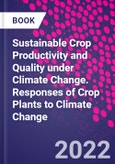Sustainable Crop Productivity and Quality under Climate Change: Responses of Crop Plants to Climate Change explores the physiological, biochemical, and molecular basis of the responses of major crop plants to a range of climate change scenarios. From the development of climate-resilient crop varieties which lead to enhanced crop productivity and quality to better utilization of natural resources to ensure food security through modern breeding techniques, it presents insights into improving yield while securing the environment.
Understanding the impact of climate on crop quality and production is a key challenge of crop science. Predicted increases in climate variability necessitate crop varieties with intrinsic resilience to cooccurring abiotic stresses such as heat, drought, and flooding in a future climate of elevated CO2. This book presents a much-needed mechanistic understanding of the interactions between multiple stress responses of plants that is required to identify and take advantage of acclimation traits in major crop species as a prerequisite for securing robust yield and good quality.
This book is an excellent reference for crop and agricultural scientists, plant scientists, and researchers working on crop plant ecophysiology/stress physiology and future crop production.
Please Note: This is an On Demand product, delivery may take up to 11 working days after payment has been received.
Table of Contents
1. Crop exposure to cold stress: responses in physiological, biochemical and molecular levels
2. Crop exposure to drought stress under elevated CO2: responses in physiological, biochemical, and molecular levels
3.Crop exposure to heat stress: responses in physiological, biochemical, and molecular levels
4. Crop exposure to waterlogging stress: responses to physiological, biochemical, and molecular levels
5. Crop exposure to salinity stress under elevated CO2: responses in physiological, biochemical, and molecular levels
6. Crop production in response to elevated CO2: grain yield and quality
7. Wheat quality under global climate change: consequences, mechanisms, and countermeasures
8. Abiotic stress responses and tolerance in wheat under climate change
9. How to deal with climate change in maize production
10. The efficacy of rhizobia inoculation under climate change
11. Physiological response mechanism of oilseed rape to abiotic stress and the stress-resistant cultivation regulation
12. Interaction of the rhizosphere microbiome and crops under climate change
13. Response of rhizosphere microbiomes to climate change
14.Climate change impacts on soil fertility in Mollisols
15. Abiotic stress priming: an effective approach for coping with abiotic stress episodes in crop production
16. High-throughput phenotype: the latest research tool for sustainable crop production under global climate change scenarios








